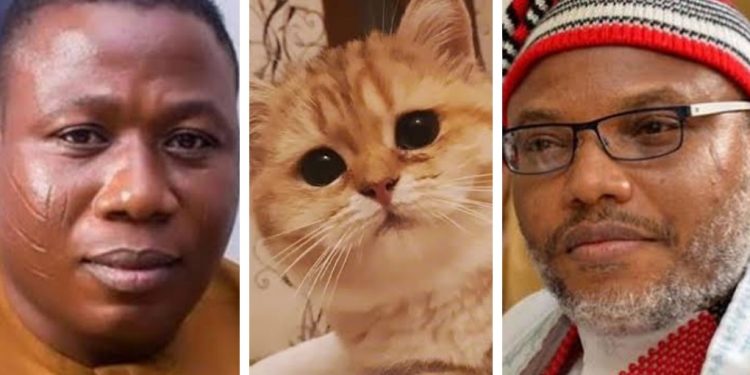By John Ikani
When news broke that the house of Yoruba rights activist, Sunday Igboho had been raided by security operatives, Nigerians were least shocked by the intent of the raid but overwhelmingly expressed disgust and felt embarrassed by how the raiders dragged innocent cats into their thoughtless handling of a movement for self-determination.
Describing how the Gestapo styled raid was orchestrated, survivors of the horrific incident told newsmen that the security operatives – upon wreaking havoc on properties and ‘wasting lives’ of at least 2 persons – “killed some of the small cats found in the house while a huge cat was taken away with the belief that Igboho might have transformed to the cat.”
While the mass resentment against the murder of the small cats and ‘arrest’ of the huge cat was a justified response to how Nigerian security operatives have stooped low in dealing with perceived crime, it also evokes memories about claims of similar actions allegedly perpetrated by the licenced thugs in uniform.
Recall that in 2018, the leader of the Indigenous People of Biafra (IPOB) Nnamdi Kanu, in a broadcast aired from his then base in Israel, mourned his dog and “a few other persons” who he said lost their lives when troops of Operation Python Dance invaded his residence in September 2017.
At the time, it was a question of who killed the innocent dog and why Kanu ‘valued it above murdered IPOB members.’ Interestingly, a similar narrative is being played out as Nigerians can’t help ‘feeling the pains’ of Igboho’s murdered cats as well as the ‘arrested’ cat while questioning the sanity of the security operatives who believe a human can shapeshift to a cat.
More appalling is the fact that the DSS in its confirmation of the operation failed to mention the ‘arrested’ cat among spoils of the raid from Igboho’s house, a development which raises more questions than answers.
With the Federal Government’s ban on Twitter and consequent widespread adoption of VPN by Nigeria based tweeps, news of the arrest of Igboho’s cat trended on US Twitter space among those of other sane countries that recognise and uphold the rights of animals.
Do animals have rights in Nigeria?
It is cringeworthy to note that Nigeria does not currently have a national law regarding animal welfare and the law against animal cruelty is outdated.
For instance, the law protecting animals in Nigeria, in the 1999 constitution, states that “any person who cruelly beats, kicks, ill-treats, over-rides, over-drives, over-loads, tortures, infuriates, or terrifies any animal, or causes or procures, or, being the owner, permits any animal to be so used “is guilty of an offence of cruelty and is liable to imprisonment for six months or to a fine of fifty naira, or to both such imprisonment and fine.”
Fifty Naira, in today’s economy, means nothing. It goes without saying that the law needs to be looked into and amended.
Therefore, animal rights currently seem non-existent in Nigeria with abuses of both human and animal rights worsening over the years.
Who else noticed how it is not uncommon for people to make videos of animals either starved, murdered or treated cruelly in Nigeria? The commonness of these videos and the ignorance with which people including law enforcers happily practice animal cruelty portends a bleak future for the nation.
Need we also recall that the Nigerian police shamelessly arrested a goat in 2009 on suspicion of attempted armed robbery? If there was anything like ‘food rights’ we would not be also quick to forget how a pot of beans and banana was taken to a police station by men of the force in 2020.
These ugly developments lend credence to the vituperations of Igboho’s eastern counterpart, Nnamdi Kanu who on numerous occasions called Nigeria a “zoo” — or the “zoological republic” — and Nigerian citizens “monkeys” or “ill-educated vagabonds.”
As Mahatma Gandhi reminds us, “The greatness of a nation and its moral progress can be judged by the way its animals are treated.”
Likewise, the words of Rachel Carson have never been so timely like they are at this time. Indeed, “Until we have the courage to recognize cruelty for what it is, whether its victim is human or animal, we cannot expect things to be much better in this world.”




































